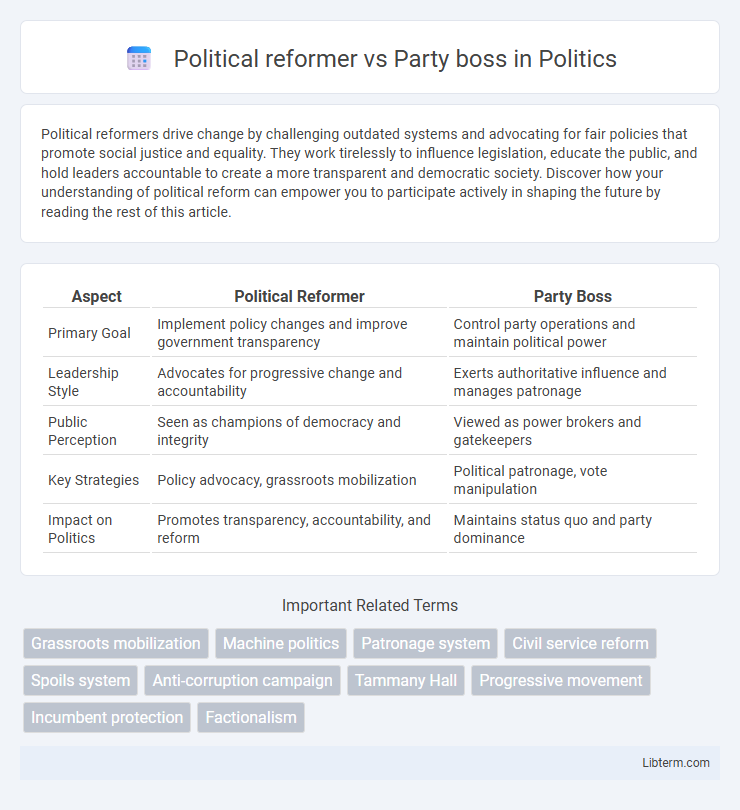Political reformers drive change by challenging outdated systems and advocating for fair policies that promote social justice and equality. They work tirelessly to influence legislation, educate the public, and hold leaders accountable to create a more transparent and democratic society. Discover how your understanding of political reform can empower you to participate actively in shaping the future by reading the rest of this article.
Table of Comparison
| Aspect | Political Reformer | Party Boss |
|---|---|---|
| Primary Goal | Implement policy changes and improve government transparency | Control party operations and maintain political power |
| Leadership Style | Advocates for progressive change and accountability | Exerts authoritative influence and manages patronage |
| Public Perception | Seen as champions of democracy and integrity | Viewed as power brokers and gatekeepers |
| Key Strategies | Policy advocacy, grassroots mobilization | Political patronage, vote manipulation |
| Impact on Politics | Promotes transparency, accountability, and reform | Maintains status quo and party dominance |
Understanding Political Reformers
Political reformers advocate for transparency, accountability, and reducing corruption within the political system, often challenging established power structures maintained by party bosses. Unlike party bosses who consolidate control through patronage and manipulate party machinery for influence, reformers promote democratic participation and policy changes to improve governance. Understanding political reformers involves recognizing their efforts to democratize political processes and curtail the undemocratic practices perpetuated by party bosses.
Defining the Party Boss
The party boss is a powerful political figure who controls a political party's operations through patronage and influence rather than ideology or policy reform. This individual often wields significant authority in candidate selection, election strategy, and mobilizing voter support within a political machine. Unlike a political reformer who seeks to change or improve governance structures, the party boss prioritizes maintaining power and party loyalty through established networks.
Historical Background of Political Reform
Political reformers emerged in the late 19th and early 20th centuries aiming to dismantle entrenched party boss systems that dominated urban political machines in the United States. Party bosses like William Tweed of Tammany Hall controlled patronage and voter loyalty through corruption and centralized power, prompting reform movements to advocate for transparency, civil service exams, and electoral reforms. These historical efforts shaped modern democratic governance by reducing political corruption and increasing public accountability.
The Rise of Party Machines
The rise of party machines in 19th-century American politics centralized power under party bosses who controlled patronage, ward leaders, and voting blocs, often prioritizing loyalty over reform. Political reformers challenged these machines by advocating for merit-based civil service, transparent elections, and anti-corruption laws to dismantle the influence of party bosses. The conflict between reformers and party bosses shaped urban governance and electoral processes, leading to significant shifts in political accountability and public administration.
Key Motivations: Reformers vs Party Bosses
Political reformers prioritize transparency, accountability, and reducing corruption to improve governance and public trust, often driven by ethical considerations and the desire for systemic change. Party bosses focus on maintaining power, controlling party resources, and mobilizing voter support to secure political dominance and influence within their organizations. These contrasting motivations reflect reformers' emphasis on integrity and party bosses' strategic pursuit of authority and loyalty.
Tactics and Strategies Employed
Political reformers prioritize grassroots mobilization, transparency, and institutional changes to reduce corruption and increase public accountability. Party bosses rely on patronage, maintaining tight networks of loyalty through control of nominations, votes, and political favors to consolidate power. Reformers often advocate for legal and procedural reforms, while party bosses focus on leveraging influence within established political machines to sustain dominance.
Impact on Governance and Policy
Political reformers prioritize transparency, accountability, and citizen participation, fostering democratic governance and progressive policy changes. Party bosses concentrate power within party structures, often influencing candidate selection and policy decisions to maintain control, which can lead to centralized decision-making and patronage. The contrasting approaches impact governance by either promoting inclusive, reform-driven agendas or reinforcing entrenched political interests and status quo policies.
Notable Figures in Both Camps
Notable political reformers such as Theodore Roosevelt and Robert La Follette championed transparency, anti-corruption measures, and voter rights expansion, challenging the entrenched power of party bosses like William "Boss" Tweed and Richard J. Daley, who wielded control through patronage and machine politics. Roosevelt's progressive policies reshaped government accountability, while Tweed's manipulation of Tammany Hall exemplified the party boss system's dominance in urban politics. This contrast highlights the ongoing struggle between democratic reform efforts and entrenched political machines in American political history.
Societal Response and Public Perception
Political reformers often gain public support by advocating for transparency, accountability, and anti-corruption measures, which resonate with citizens seeking ethical governance. Party bosses, meanwhile, elicit mixed societal responses due to their control over political machines and patronage systems, sometimes viewed as effective organizers but also criticized for fostering nepotism and entrenching power. Public perception tends to favor reformers for their commitment to systemic change, while party bosses are frequently seen as symbols of entrenched political power and resistance to reform.
The Lasting Legacy of Reformers and Party Bosses
Political reformers champion transparent governance and policies aimed at reducing corruption, often leaving a lasting legacy of strengthened democratic institutions and public trust. Party bosses wielded significant influence in political machines, shaping candidate selection and voter mobilization, but their legacies are frequently marked by patronage and entrenched power structures. The enduring impact of reformers manifests in systemic changes and increased civic engagement, whereas party bosses are remembered for their role in shaping political landscapes through centralized control and strategic alliances.
Political reformer Infographic

 libterm.com
libterm.com